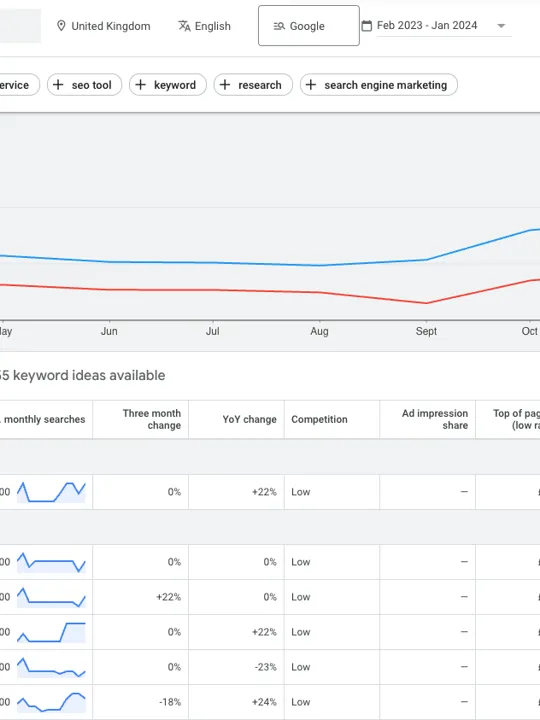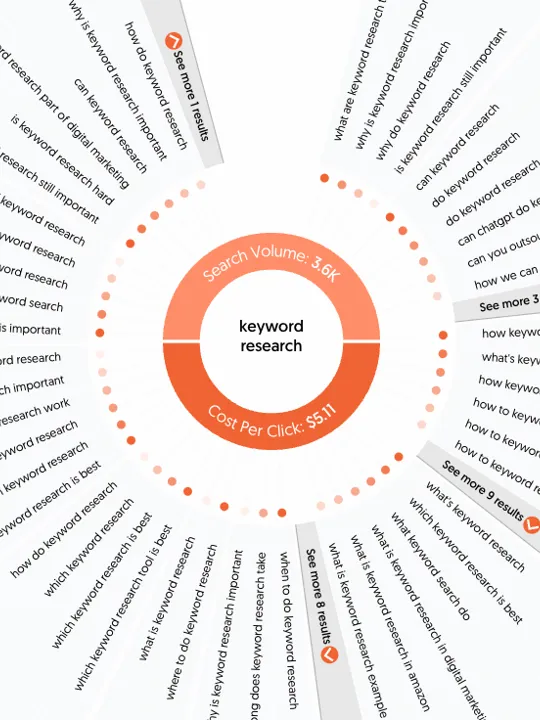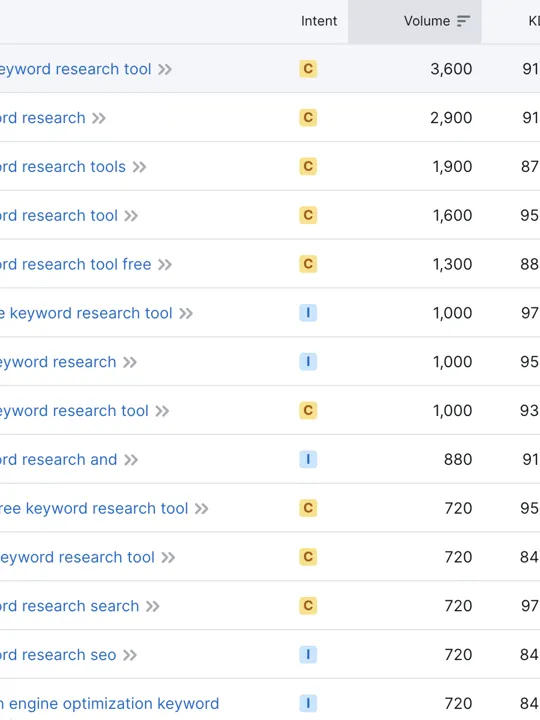How to do keyword research for SEO
SEO (search engine optimisation) is one of the fundamental areas of digital marketing and SEO keyword research is a huge pillar of an SEO strategy, helping SEOs find keywords and search phrases to target. By understanding what users are specifically searching for, SEOs can help to optimise website content, page titles, headings, meta descriptions and blog content so that pages and content rank for those specific words and phrases, reaching a higher search volume of consumers.
What is keyword research?
Keyword research is a fundamental aspect of SEO and the backbone of a targeted strategy. Keyword research is the process of identifying and analysing the search terms that people enter into search engines like Google, Bing, and Yahoo. By understanding the keywords that your target audience is using, you can tailor your website content and onpage elements to target these keywords which will improve your chances of ranking higher in search results page and therefore drive more website traffic.

Why is SEO keyword research important?
- Increased website traffic: When your website appears at the top of search results for relevant keywords, you'll attract more visitors from search engines. This can significantly boost your website traffic and lead to more leads and sales.
- Targeted audience: By targeting specific keywords, you can attract visitors who are genuinely interested in your products, services, or information. This means that your website visitors are more likely to be qualified leads who are ready to convert.
- Improved brand recognition: Consistent use of relevant keywords throughout your website can enhance your brand's visibility and recognition. This will make your brand more familiar to potential customers and make it easier for them to find you when they're searching for information related to your industry.
- Competitive edge: Keyword research can help you identify and track your competitors' keywords. This will give you insights into their SEO strategies and help you develop your own strategies to outrank them.
- Consistent optimisation: Keyword research is an ongoing process that should be updated regularly. This is because consumer habits and search trends are constantly changing and the relevant keywords today may not be relevant tomorrow. By regularly conducting keyword research, you can ensure that your website is always fully optimised for the latest search trends to match consumer habits.
- Improved website structure: Keyword research can help you identify the most important topics on your website and structure your content accordingly. This will make it easier for search engines to crawl and index your website, which can improve your ranking in search results.
- Enhanced user experience: By using relevant keywords throughout your website, you can create content that is more relevant and useful to your target audience. This will improve the overall user experience and make your website more likely to rank high in search results.
- Stronger backlinks: When other websites link to your website, it can help to improve your search engine ranking. Keyword research can help you identify websites that are relevant to your niche and reach out to them to request backlinks.
- Cost-effective marketing strategy: Keyword research is a relatively inexpensive SEO strategy. It can be done with various free or low-cost tools, and it can have a significant impact on your website traffic and search engine ranking.
- Long-term impact: Keyword research is a long-term investment in your website's success. The keywords that you select today can help you attract visitors and drive sales for years to come, as long as the SEO strategy is solid.
How to conduct keyword research
- Keyword research sounds like an extensive process, and to the untrained eye, it probably is. Luckily, our marketing team is well-versed in all things SEO and conducts our SEO keyword research with years of expertise.
- Start with a list of seed keywords. These cover all of your service offerings and are the base terms for what you think people might be searching for related to your business. I.e. “hotels with pool”, “Italian restaurant”.
Input them into a keyword research tool and extract (copy and paste) any relevant keywords that are related to your business along with the search volume. For example “hotels with pool in [location]”, “spa hotels [location]”. - Once you have researched your full list, map the keywords out into groups based on topic clusters so all similar and related keywords are grouped. For example all spa-related keyword phrases, all restaurant related, etc. This will form your pages.

Keyword research tools
There are a variety of keyword research tools out there, and likely, every marketer and SEO will have their favourite that they swear by. Some of the most common SEO keyword research tools are listed below.
Semrush Keyword Magic Tool
Semrush Keyword Magic Tool is a comprehensive keyword research tool that offers a wide range of features. Semrush provides access to a vast database of keywords, along with data on search volume, competition level, and keyword difficulty. The tool also offers a variety of filters and sorting options to help you narrow down your search and find the most relevant keywords for your target audience.
Google Ads Keyword Planner
Google Ads Keyword Planner is another keyword research tool. This one is a free tool that offers basic keyword research capabilities. It is primarily designed for advertisers who want to find keywords to target in their Google Ads campaigns. However, it can also be used by SEO professionals to identify relevant keywords and get a general idea of search volume and competition levels.
Ahrefs
Ahrefs is one of the most popular and powerful keyword research tools available. The tool has a massive database of keywords and provides detailed data on search volume, competition level, and keyword difficulty. Ahrefs is a more expensive option than Semrush or Moz, but it is worth the investment for businesses that need a comprehensive SEO tool with advanced features.
Moz Keyword Explorer
Moz Keyword Explorer is a more affordable alternative to Semrush and Ahrefs. The tool provides access to a smaller database of keywords, but the data it provides is still accurate and reliable.

We can help
Still require more information about competitor ads? Need help with a detailed digital marketing strategy? Not sure how to go about getting the most out of monitoring your competitors’ ads? Don’t worry, we can help with all of that.
We’ve got our finger firmly on the pulse of digital marketing trends, updates and strategies and can work with you to curate a specialist strategy for your hospitality business. Get in touch to have a chat with the team and find out more about how we can help you.